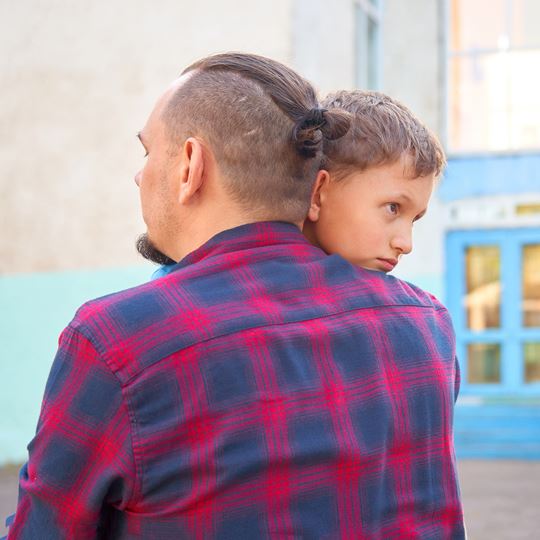There are many reasons why children are taken into foster care but the most common are due to either being at risk of or experiencing abuse or neglect.
Recent national fostering statistics show that in England, there are 82,170 children in the care system, with 57,540 being in foster care.
Sadly, 63% of these children are in care due to a history of abuse and neglect. But there are other reasons too, such as a parent's illness or their inability to care for their child due to poor mental health, police involvement or domestic abuse within the family home.
Why do children go into foster care?
It’s quite a complex picture and as a potential foster parent, it’s good to understand the various reasons why children come into care and how this may affect them. Here are some of the reasons for a child to be taken into care.
Neglect
There are various types of neglect, including physical, educational, emotional or medical. Children who have been taken into care may have experienced a combination of these.
Due to the nature of neglect and its impact on brain development, children may present themselves to be much younger than their physical age. We also find that children who have suffered from neglect are more likely to be behind their peers in key developmental milestones, such as reading, speaking and personal hygiene.
Alongside their day-to-day parenting role, foster parents have a critical role in the development of key life skills, confidence and improved academic performance.
Abuse
A child may be removed from their family and placed in foster care if it’s believed that they’ve experienced or are at significant risk of abuse; whether that’s physical, emotional or sexual abuse.
Abuse of any kind can have a detrimental impact on a child, including how they perceive themselves and the world around them. As a result of their negative life experiences, they may display behavioural problems and find it difficult to form positive, trusting relationships.
Foster parents provide a safe and nurturing family environment, where children no longer have to be afraid. They spend time forming a positive attachment with the child, so they can help them to heal from their past experiences, boost their self-esteem and enable them to lead a fulfilling life.
Family dysfunction
Children may be placed in care due to a family dysfunction. This is when the parenting capacity is determined as ‘chronically inadequate’, meaning that the child’s needs are not being met.
Often, a child who’s been placed in care due to these circumstances may have experienced an ongoing parent-child or sibling conflict, domestic violence within the family home, parental mental health issues or something else that has put the child’s safety, health and wellbeing at risk.
Children will often come into care and require an emergency foster care placement, while court orders are sought. A foster parent may need to maintain the child’s contact with their family and support their emotional needs.
Child or parent’s illness or disability
A parent’s illness or disability can sometimes prevent them from being able to provide adequate care to a child. Other times, it may be the child who has a disability or illness and for various reasons, the parent isn’t able to meet their needs.
In these circumstances, foster care provides the child with a welcoming, loving home, where their needs are met, and regular contact is arranged to maintain positive relationships between the child and their family (if appropriate).
Every child’s circumstances are unique and we offer different types of foster care placements, along with various specialist training opportunities for our staff and foster families – including foetal alcohol syndrome, ADHD and autism training – so we can continue to meet the needs of children coming into foster care.
Family in acute stress
A child may need to be placed in foster care on a temporary basis, while the family is going through a crisis that has impacted their ability to meet the child’s needs. This may be a significant death in the family, finance issues, homelessness and eviction, trouble with the police (either the parent or child), or perhaps even gang-related issue which leaves the young person at risk of harm.
A foster parent would provide the child with a stable, family environment where they can stay until they’re able to return home. They’ll try to maintain the child’s routine and boundaries, including school runs, mealtimes and bedtimes, facilitate contact with family and link the child in with specialist services they may need.
Absent parenting
A child may need fostering because they have no parents available to provide for them; for example, their parent or legal guardian may have passed away.
Foster parents are a vital source of emotional support in these scenarios, helping the child grieve and start to rebuild their life. They may also facilitate regular contact between the child and their birth family, including siblings (if they’re not living together), grandparents and other family members if it’s within the child’s care plan.
You might be interested in...

Types of fostering
There are many different types of foster care placements, including long and short term, respite, parent and child and more.
Read More
Allowance calculator
Try our allowance calculator today to find out how much you could receive from fostering.
Read More
Assessment process
It may not be as difficult as you think to become a foster parent and the process takes around 4-6 months.
Read MoreFrequently asked questions
How does fostering work?
The ultimate goal of fostering is to improve the outcomes for children, so they can go on to lead healthy, happy and fulfilling lives.
To achieve this, foster care providers, such as Orange Grove, recruit, train and reward a diverse team of passionate individuals who open their homes to children in need. And we’re always on the lookout for people interested in becoming a foster parent.
When a child enters care, they will have their needs professionally assessed and included within their personal care plan. We work closely with local authorities to find a foster parent who will be able to meet these needs and care for them for as long or as little as required.
Foster parents may care for a child for a night or two, several months or years, or even on a long-term basis until the child turns 18.
What's the difference between fostering and adoption?
There are some key differences between fostering and adoption. The main difference is around legal responsibility for the child; when you foster a child, the legal responsibility often remains with the birth parents or the local authority in some cases, however, you become the legal guardian when adopting.
Other key differences include;
- Length of time you'll care for a child - when fostering, you can care for a child for as little as a day or two, and up to 18 years until they reach independence. With adoption, you'll care for the child as you would your own birth children and they'll be part of your family forever.
- Age of children - Children who are looking to be adopted are generally younger (under 6), whereas with fostering, the young person is likely to be over 6 or in foster care with siblings.
- Allowances - foster parents receive a weekly fostering allowance to cover the cost of caring for a child and provides them with a professional fee. This financial package is not available to adoptive parents.
How much is a foster parent paid?
Fostering allowances vary from agency to agency, and even local authority. However, allowances are generally around £400 - £450 per week, per child.
Find out how much you could receive fostering with Orange Grove below.
Please make sure you read our terms and conditions because you're agreeing to them by submitting an enquiry. It's also worth reading our privacy policy and cookies policy so you understand how we collect and use your personal data.
Ready to start your fostering journey?
By phone
One of our team is available to talk to you over the phone to answer any of your fostering queries.
Enquire online
You can get in touch by filling out our online enquiry form with any queries that you may have.
Your local office
We have local teams covering most of England. Find your local office today.

